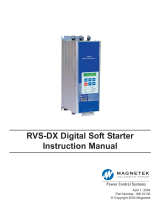
2 • vacon Introduction
Tel. +358 (0)201 2121 • Fax +358 (0)201 212 205
INDEX
1. Introduction .....................................................................................................................................3
2. Commissioning................................................................................................................................4
2.1 Commissioning unbalanced load ..........................................................................................4
2.2 Commissioning balanced load ..............................................................................................5
3. Control I/O .......................................................................................................................................7
4. Beam Pump Application – Parameter lists....................................................................................8
4.1 Monitoring values (Control keypad: menu M1)..................................................................... 8
4.2 Basic parameters (Control keypad: Menu M2 Æ G2.1) ......................................................11
4.3 Input signals (Control keypad: Menu M2 Æ G2.2) .............................................................. 13
4.4 Output signals (Control keypad: Menu M2 Æ G2.3)............................................................ 14
4.5 Drive control parameters (Control keypad: Menu M2 Æ G2.4).......................................... 15
4.6 Prohibit frequency parameters (Control keypad: Menu M2 Æ G2.5)................................. 15
4.7 Motor control parameters (Control keypad: Menu M2 Æ G2.6)......................................... 16
4.8 Protections (Control keypad: Menu M2 Æ G2.7)................................................................. 17
4.9 Autorestart parameters (Control keypad: Menu M2 Æ G2.8) ............................................ 18
4.10 Closed Loop parameters (NXP) (Control keypad: M2 → G2.9)........................................... 18
4.11 Advanced Open Loop parameters (NXP) (Control keypad: M2 → G2.10)........................... 18
4.12 CanBus parameter (Control keypad: M2 → G2.11) ............................................................ 19
4.13 Keypad control (Control keypad: Menu M3)........................................................................ 19
4.14 System menu (Control keypad: M6) .................................................................................... 19
4.15 Expander boards (Control keypad: Menu M7) .................................................................... 19
5. Description of parameters............................................................................................................ 20
5.1 Basic parameters ................................................................................................................20
5.2 INPUT SIGNALS ...................................................................................................................25
5.3 OUTPUT SIGNALS................................................................................................................ 30
5.4 DRIVE CONTROL .................................................................................................................. 33
5.5 PROHIBIT FREQUENCIES.................................................................................................... 37
5.6 MOTOR CONTROL................................................................................................................ 38
5.7 PROTECTIONS...................................................................................................................... 42
5.8 AUTORESTART PARAMETERS ............................................................................................49
5.9 CLOSED LOOP PARAMETERS ............................................................................................. 52
5.10 ADVANCED OPEN LOOP PARAMETERS ............................................................................. 54
5.11 CAN BUS PARAMETER ........................................................................................................ 54
5.12 KEYPAD CONTROL PARAMETERS ...................................................................................... 55





















